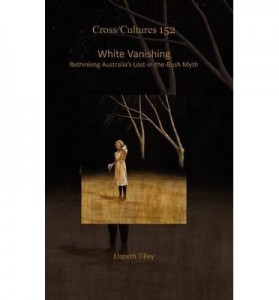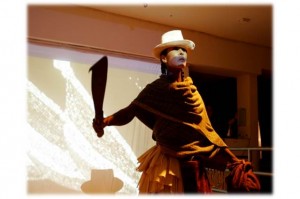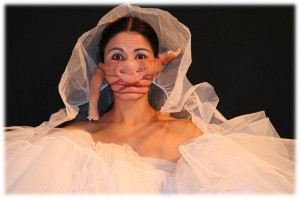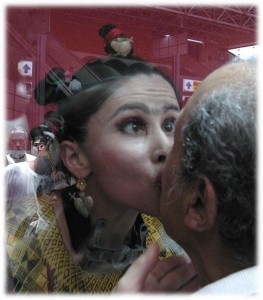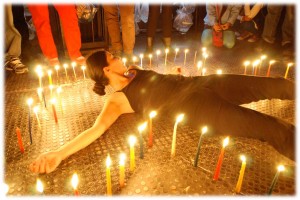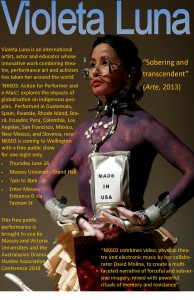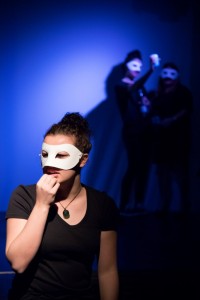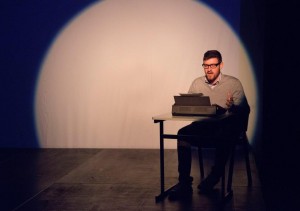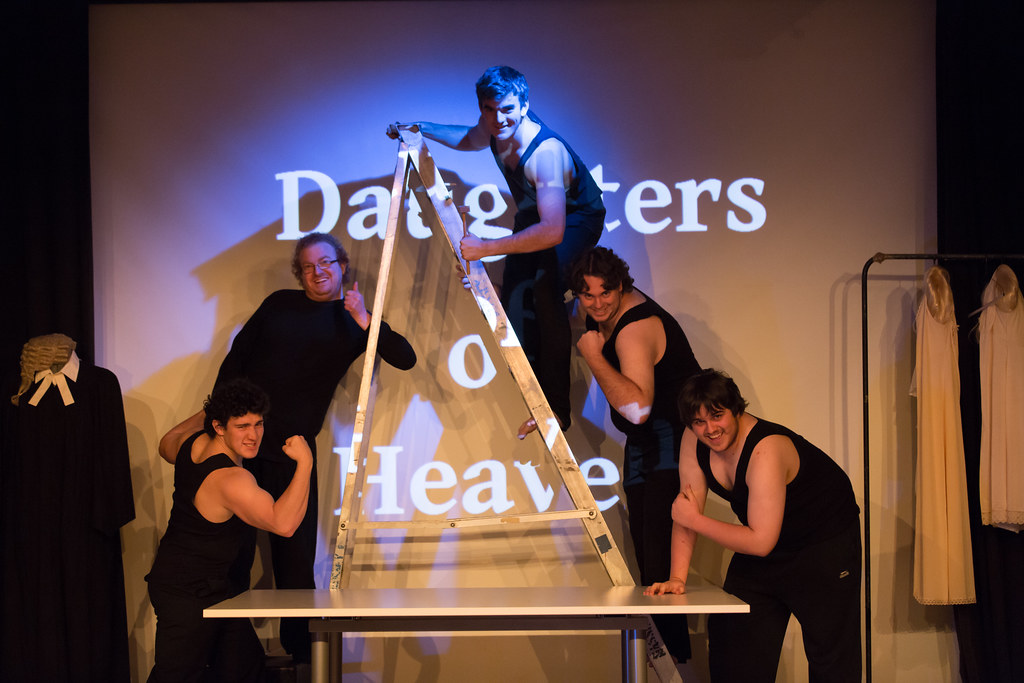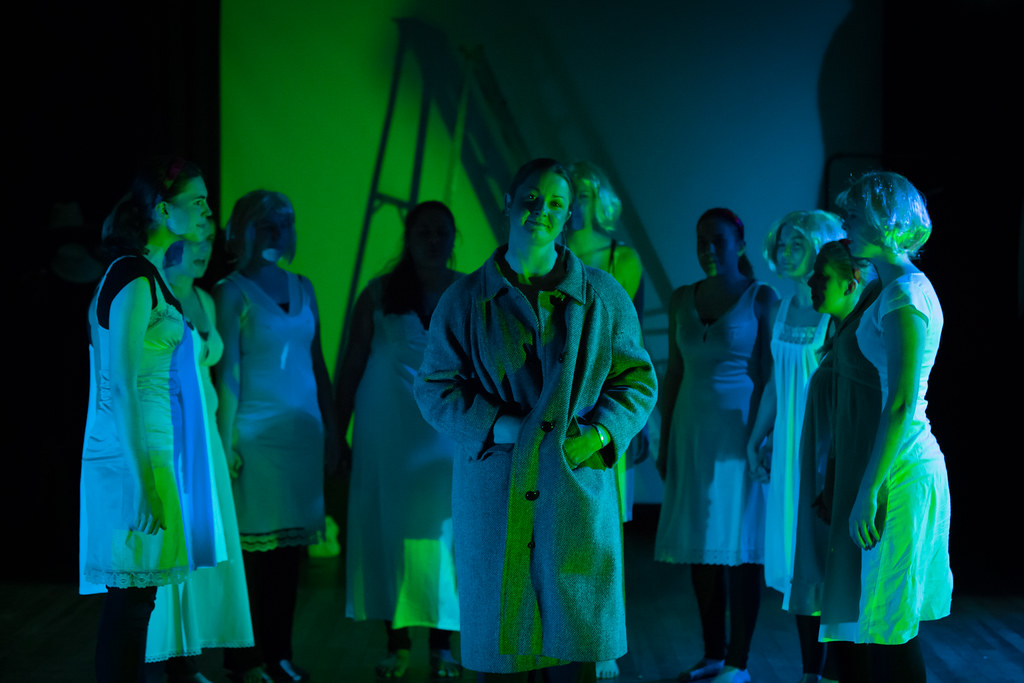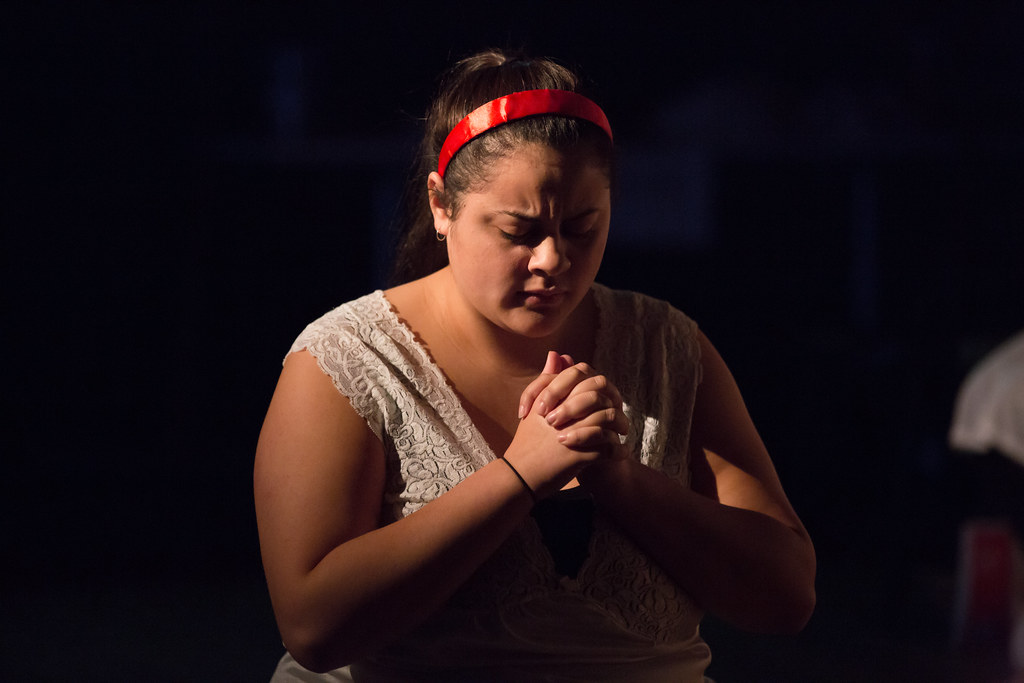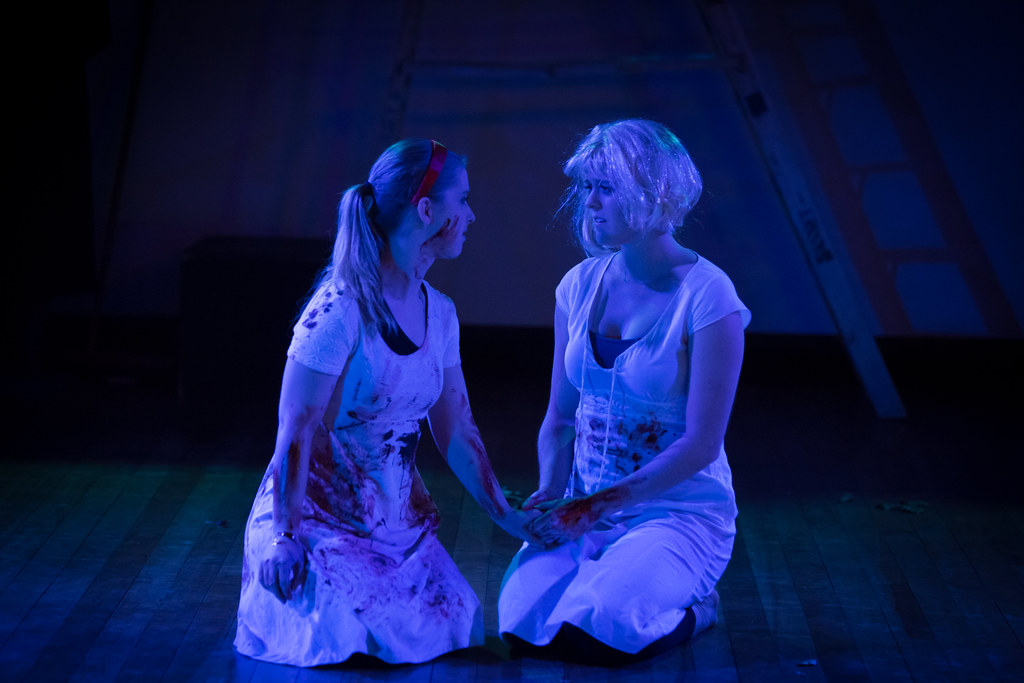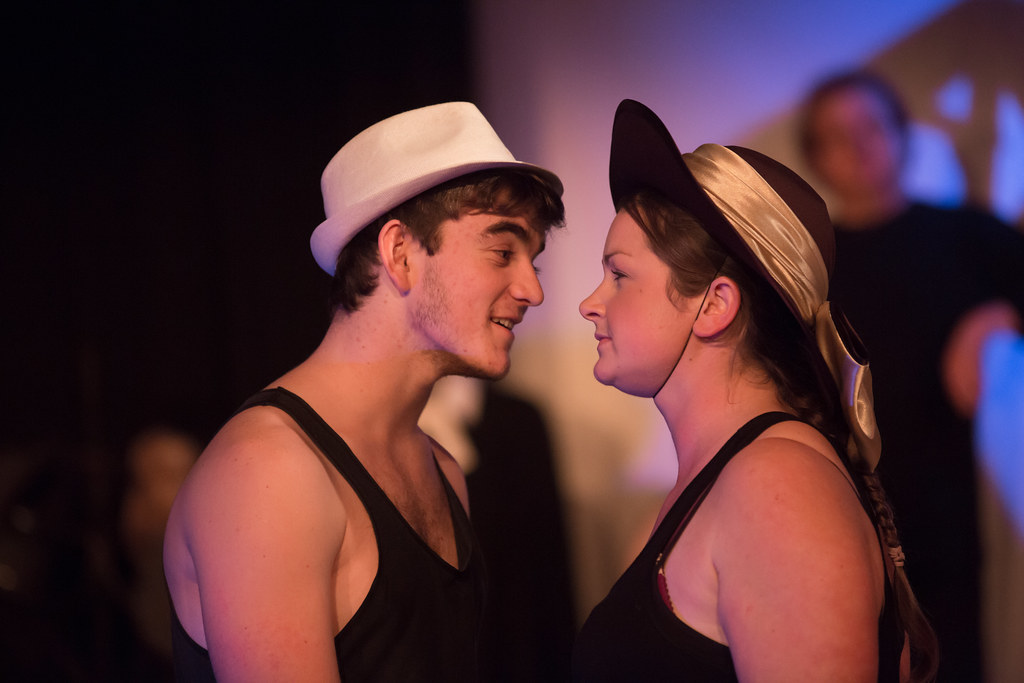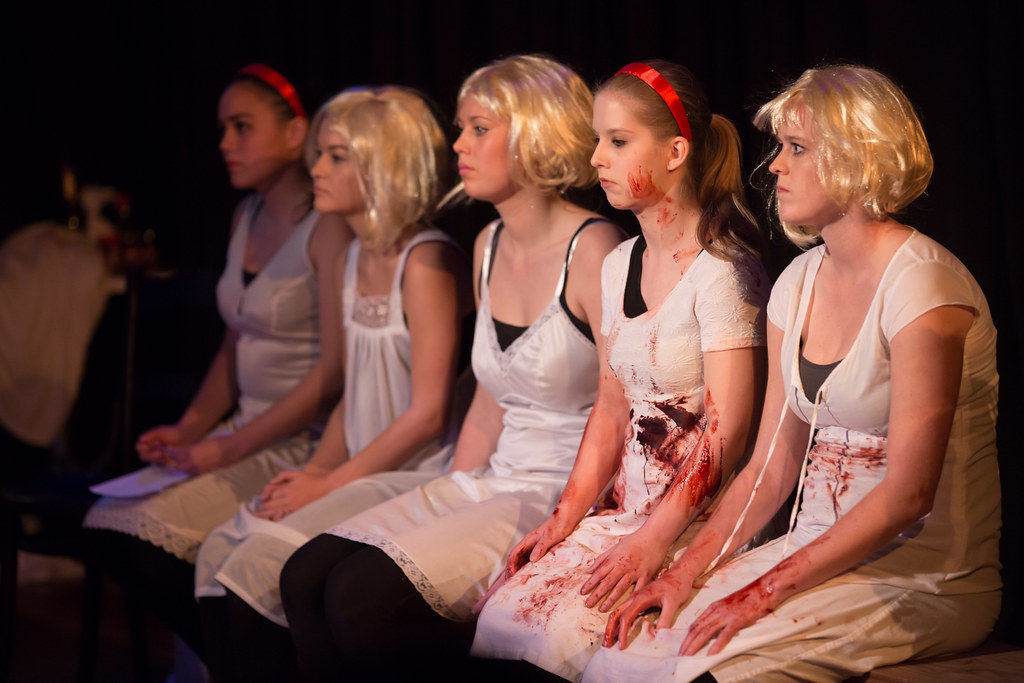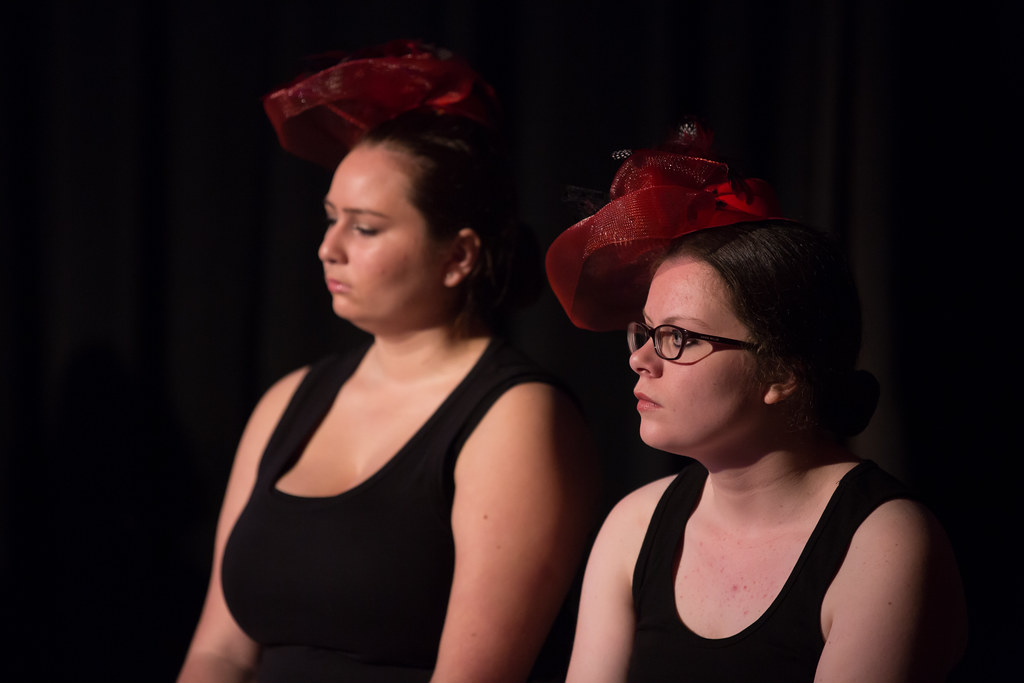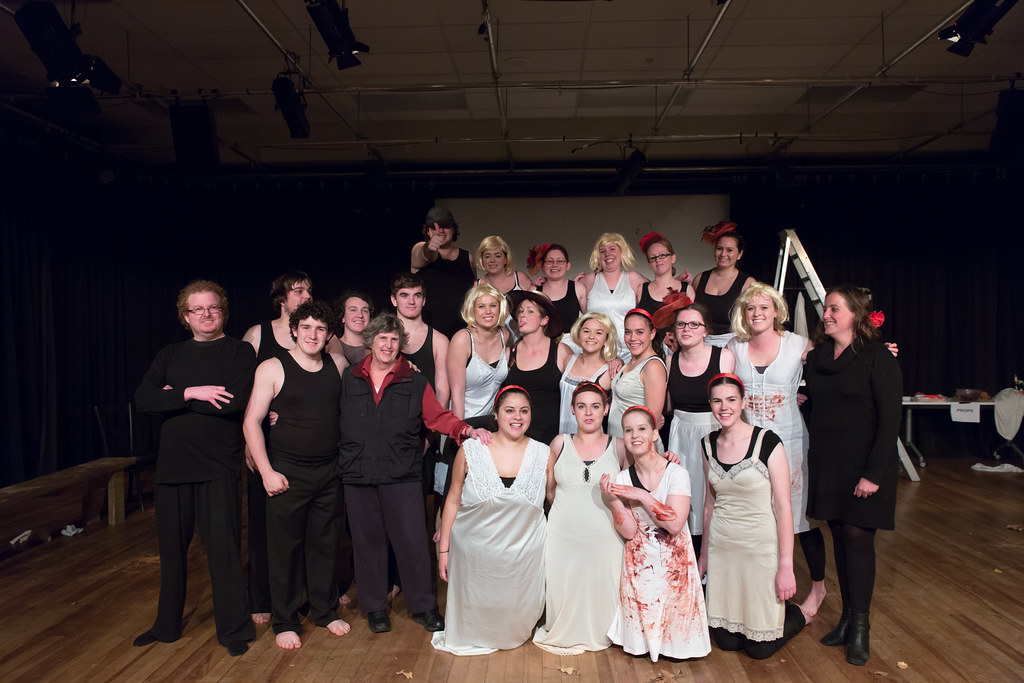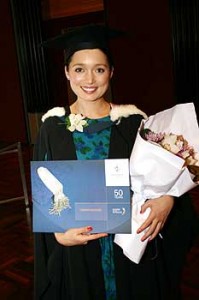Editorial
Welcome to the third edition of NUTS NZ – the Newsletter for University Theatre Studies New Zealand. The purpose of the newsletter is to help us communicate more effectively as a community of scholars interested in Theatre and Performance. A quick ‘save the date’ to note – Dr. James McKinnon has confirmed that Victoria University will be hosting both the Postgraduate Examiners Meeting and the meeting for the NZ Universities Committee for Theatre/Performance Research on Monday 10th November. We have an interesting selection of stories and news items for you in this issue of NUTS NZ. However, we do feel this is only a small selection of various events/initiatives/research happening in theatre programmes across the country. The effectiveness of this newsletter depends on you to think ahead and send us news items about any upcoming events or initiatives that you think our wider community should be informed about. We are hoping that you might take a moment to forward this email to your program administrator with a ‘heads up’ about our next deadline. We have one more issue of NUTS NZ before the end of the year which is due for circulation on 30 November 2014. Please send us information by 31 October. Submissions for the final issue for this year should be sent to the NUTS NZ editor Jane Marshall: j.g.marshall@massey.ac.nz
Kind regards,
NUTS NZ editors: Jane Marshall and Rand Hazou.
NUTS People
In each edition of NUTS NZ we profile an academic and a postgraduate student to show case “our people” and their current research/interests. It is our pleasure to be profiling Asoc. Prof. Angie Farrow and postgraduate student Robert Gilbert. NUTS NZ asked each of them to answer the following questions:
- What is your research about?
- What theatre/performances have you seen recently?
- What have you been reading lately?
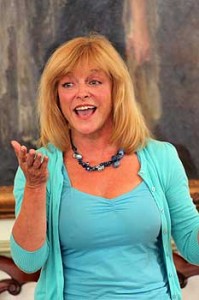
Associate Professor Dr. Angie Farrow – Massey University
Associate Professor Dr. Angie Farrow – Massey University
Research: I am interested in big stories and what theatre has to do to tell them. In the past several years I have written full-length plays about genocide (Despatch, 2007), identity, community and belonging (Before the Birds, 2009) and river pollution in The Manawatu (The River, 2012). I began my most recent project in Berlin this year where I had a residency in the Centre for Arts and Urbanistics and worked with the local refugee centre in Moabit. The play, called Asylum, focuses on the international refugee problem. It traces the stories of two women, one a right-wing politician’s wife and the other, a refugee from somewhere in the Middle East (the play does not specify place in order to universalise the issues). Somehow their lives intertwine and the narrative provides an opportunity to explore questions about humanitarian responsibility at a time when the refugee problem has hit crisis point. Although there are multiple characters, (the play is epic in scale) the cast comprises four actors from different ethnicities.
Writing Asylum has been an exhausting experience: entering the lives of people who have suffered loss of home and community or who have witnessed or experienced atrocities, has required a lot of emotional stamina. Refugee stories have filled my dreams and haunted my imaginings: translating them into theatre has thoroughly tested all my skills. But the drive to tell these narratives continues to fuel the process: the project is carried by an urgency that I could not have predicted. I hope to have a final draft of the play completed by the end of this year.
When I am not writing big, absurdly ambitious plays, I seem to be creating very short ones. Right now, I am putting the finishing touches to a book of 14 ten-minute plays called ‘Falling and Other Plays’ to be published in the spring. Short plays usually require less emotional stamina though they can be very time-consuming.
Theatre: Constellations by Nick Payne and directed by Massey Theatre tutor, Rachel Lenart (Circa Theatre, Wellington). It explores issues of chance, choice, coincidence and multiple possibilities in the trajectory of a young couple’s relationship. It asks us to compare the constellations of this relationship with those of the universe. “Every choice, every decision you’ve ever made and never made exists in an unimaginably vast ensemble of parallel universes.” (Constellations). This is a fascinating play, intelligently and elegantly directed by Rachel.
The Mercy Clause: Written by award-winning playwright, Philip Brathwaite (Centrepoint Theatre, Palmerston North), it features a young lawyer whose new client is suspected of killing his father. Was this a mercy killing? The play cleverly explores what it means to be merciful, yet, it provides no answers, only ambiguities and grey areas about the complexity of human behaviour and motivation. “Ethics and morals and right and wrong – they’re just words. They just mean what you decide they mean.” (The Mercy Clause)
Reading: Sculpting in Time: The Great Russian Filmmaker Discusses his Art by Tarkovsky. The book sets down Tarovsky’s thoughts and memories and reveals the original inspiration for several of his films. It is a wonderful read for anyone interested in the creative process.
The Crime of Sheila McGough by Janet Malcolm. The book provides a series of amazing insights about a legal narrative that took place in America. Sheila McGough, a lawyer, was convicted of crimes she did not commit and Malcolm’s examination of her case is revealing, compassionate, and fascinating. I have become a fan of Malcom’s unconventional reportage because she manages to convey the complexities and contradictions that reveal her fascination about what makes us tick.
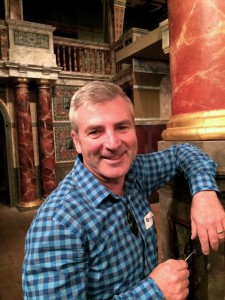
Robert Gilbert – Post graduate student, Massey University
Robert Gilbert – Post graduate student, Massey University
Research: A couple of years ago, for a postgrad’ research project, I was fortunate enough to have the opportunity to combine traditional European story-form with Māori cultural dynamics by writing a play for children. The result was so personally rewarding that under the expert guidance of award-winning playwright and academic, Dr Angie Farrow, I sought to develop my writing further by attempting to pen a full-length play for adults. My recently completed master’s thesis looked at transgender representation in theatre, and the theatrical considerations in writing a play that might broaden the debate around transgender issues in New Zealand. This fascinating journey began with lengthy interviews of transgender kiwis. Apart from authentic source material for the play, the interviews gave me a rare insight into a word of marginalised people who are often ridiculed and misunderstood. The research included an examination of transgenderism, the theatrical representation of transgender characters, and cross-dressing in theatre from the ancient Greeks to Shakespeare and beyond. I also explored theatre forms and examples of dramatic narrative to guide my thinking and my own writing. The thesis included the play I wrote: Trans Tasmin. I was delighted with the opportunity to have two workshops of the script, one in The Dark Room in Palmerston North, and one at The Court Theatre in Christchurch. These were incredibly rewarding experiences and I was thrilled with the outcome. Subsequently, a professional theatre company has shown interest in the script, and with their guidance and support I am currently writing a new draft and crossing my fingers that, ultimately, it will be staged.
Theatre: I have been privileged to see nearly 30 productions so far this year. What a blessing to be in a position to have the soul fed so regularly. I have been inspired, moved and challenged. There have been so many highlights. These are but a few:
- Needles and Opium – devised and directed by Robert Lepage, at the New Zealand Festival in Wellington. What a genius theatre mind he has. Truly innovative.
- Black Faggot by Victor Rodger, also at the New Zealand Festival. Genuinely funny writing that cuts to the quick. Prejudices are exposed in a deceptively simple theatrical framework. Brilliant.
- Titus Andronicus at Shakespeare’s Globe in London. A bold and bloody production directed by Lucy Bailey who really maximises the Globe space. Deeply moving performances. Three and a half hours seemed like minutes. Breathtaking.
- Medea at The National Theatre in London. An inspired modern-dress production. Helen McCrory was devastating in the title role.
- There were three stellar performances at The Court Theatre in Christchurch which would be at home on any international stage: Eilish Moran in End of The Rainbow, Mark Hadlow in When the Rain Stops Falling, and Benjamin Hoetjes in Blood Brothers.
Reading: Crave by Sarah Kane. One of only five plays by this troubled genius. Profound, complex, disturbing, and heartbreaking.
Winter of the World by Ken Follett. The second instalment of a wonderfully researched historical trilogy. Epic escapism.
Shakespeare’s Restless World by Neil MacGregor. The discovery of Elizabethan England by examining relics and artefacts of the age. Absorbing, insightful and compelling.
Events & Initiatives:
Re-storying disability through the arts: Providing a counterpoint to mainstream narratives
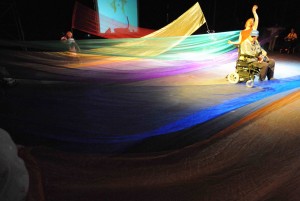
On Friday 8th August the University of Auckland’s School of Critical Studies in Education and Critical Research Unit in Applied Theatre (CRUAT) hosted a half day symposium exploring inclusive practices in storytelling, theatre and film. The programme included presentations and workshops by three communityarts practitioners: Keith Park, Paula Crimmens and Hank Snell and was chaired by Rod Wills and Molly Mullen, Lecturers in the Faculty of Education. One aim of the event was to start a productive exchange between students, researchers, artists and other practitioners. In response to the presentations, attendees were invited to discuss the ways in which the arts can provide a counterpoint to mainstream narratives about disability. Based on this discussion future symposia will explore a range of issues and practices in inclusive and disability arts.
The Critical Research Unit in Applied Theatre aims to serve as an international focus for research in applied theatre. Its activities include a wide range of research projects, events and symposia. For more information see: http://www.education.auckland.ac.nz/en/about/schools-departments/crstie/crstie-research/crstie-research-units/cruat.html, or contact p.o’connor@auckland.ac.nz or m.mullen@auckland.ac.nz.
Theatre to Help Firms deal with workplace bullying
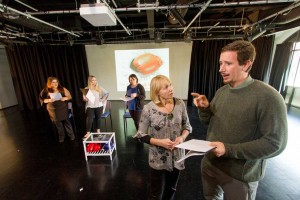
A reading of Edward’s ‘In the Red Corner’ at the Theatre Lab at Massey, Albany.
Feelings and emotions are often marginalised in the rational world of business, but Massey University’s expressive arts and business programmes hope to change all that with the development of a play about workplace bullying. Dr Margot Edwards, a senior lecturer with the School of Management, wanted to create an effective intervention for dealing with bullying at work. Instead of producing the usual seminar, she decided to write a play. “I wanted to actually create something interactive to get people thinking in a different way about how bullying makes people feel and what the reasons behind it might be,” Dr Edwards says. Now Dr Edwards has teamed up with the university’s theatre studies programme to get her play, titled ‘In the Red Corner’, ready for performance. Students from the Massey University Theatre Society workshopped it through an open reading in the Albany campus’ state-of-the-art Theatre Lab. School of English and Media Studies lecturer Dr Rand Hazou says the project has been a great opportunity for the business and expressive arts programmes to collaborate. Dr Hazou says the play fits well within the tradition of applied theatre, which he has a particular interest in. “We introduced a new Applied Theatre paper here at Massey last semester – it looks at theatre applied outside conventional performance spaces as a way of bringing about social change. “When Margot told me she had written a play about bullying and she wanted to develop it so it could be presented in workplaces to spark discussion, I thought, ‘Great, this is exactly what I’m interested in – theatre with a real-life application that tries to bring about change in the way we see things.’” ‘In the Red Corner’ is set in the fictional Blackrock General Hospital and shows the interaction between a bullying director of nursing and a nurse union representative. The content is inspired by the research findings of one of Dr Edwards’ PhD students whose thesis looks at workplace bullying in nursing. Dr Edwards says she first began to think about writing plays after using role play when teaching leadership skills.
There are already plans to perform ‘In the Red Corner’ at a harassment workshop later in the year and Dr Edwards hopes customised versions of the play will be taken into workplaces where bullying is known to occur. She says her hope is that workers “walk out of the room as different people to when they walked in.” Down the track, both Dr Edwards and Dr Hazou would like to see Massey offer the services of an acting troupe to businesses, with theatre students being paid to perform thought-provoking plays in workplaces around the country.
Free Theatre Christchurch
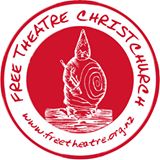
Free Theatre Christchurch (est. 1979) is New Zealand’s longest running producer of experimental theatre. It was established by a group of staff and students at the University of Canterbury who wanted to create an alternative to the Court Theatre (for a brief history of Free Theatre see: http://www.freetheatre.org.nz/a-brief-history.html).
While the company has continuously run as an independent professional theatre company, its founder Peter Falkenberg was instrumental in establishing the Theatre and Film Studies Department (TAFS) at the University of Canterbury in 1997, which went on to develop the strongest postgraduate research culture of its kind in the country. Although remaining an independent legal and financial entity from the university, Free Theatre kept a close association with Theatre and Film Studies for two principle reasons: the Department provided in-kind support for Free Theatre (space and technical assistance) in recognition of Free Theatre’s contribution to high quality research and teaching in the Department; and members of Free Theatre ensemble have, in different capacities, all been involved in performance research, which helps maintain the integrity of Free Theatre’s experimental spirit. Creating, writing about, and teaching theatre and film leads to a dynamic, exciting, mutually beneficial environment.
Since 2008, TAFS has been under constant attack from university management, surviving two attempts to disestablish the department. Despite surviving one such attack in 2012 (with the university council voting to retain the department because of its extraordinary research and community outputs) another proposal in 2013 was successful. The department will close in 2015.
However Free Theatre – which counts among its members former TAFS staff and students – has a strong reputation for innovation which has only grown in profile in the post-quake environment of Christchurch. As a result, the company has been offered the first arts-practice tenancy in the restored Arts Centre. In collaboration with the Arts Circus, Free Theatre will present a programme of new works, an education programme and provide space and facilities for festivals and events.
The company’s major work for 2014 will be Kafka’s Amerika and will be the first in the new space which is called The Gym:
Following on from the success of I Sing The Body Electric, which was named Best Theatre for 2012 by The Press, Free Theatre is laying the groundwork for a new theatrical project that takes further our experimentation with the latest available technology: Kafka’s Amerika. Conceived as an interactive multimedia theatre production, this innovative project explores the all-pervasive America of our present as achieved utopia or nightmare. How has the “American Century” (just passed) come to dominate our lives, the ways we think and act, and how might we in New Zealand move beyond the limitations of this mindset and forge a new identity in this century? These questions are especially pertinent to Christchurch, where our notion of who, what and where we are has been shaken to the core, inviting a dynamic and urgent conversation about the multiple possible futures we might work towards as we embark on the creation of a new city. In Kafka’s unfinished novel Amerika, these hopes and fears are symbolised by large angels that dominate a theatre that goes beyond its limits. Another connection we want to draw is to Paul Klee’s Angel of History as interpreted by Walter Benjamin, taking further an exploration we started in our most recent production Canterbury Tales. As part of the Kafka’s Amerika project we want to engage visual and sculptural artists to create angels that speak to the current situation. These angels will serve as interactive touchstones for the performance. The last chapter of Kafka’s Amerika, “The Nature Theatre of Oklahoma” serves as a foundation and starting point for our theatrical exploration. Other texts by Kafka will also be used as well as fictional imaginations from John Donne to Andy Warhol and his latest disciple Lady Gaga. The idea of surveillance by American agencies will also play a part in the conception of our theatrical enterprise as a kind of digital panopticon that will be created with designers, filmmakers and multi-media artists. The controversial whistleblower Edward Snowden will feature in our explorations as a possible stand-in for the protagonist in Kafka’s novel.
Some recent media links on The Gym:
Programmes
New creative activism paper at Massey launching 2015
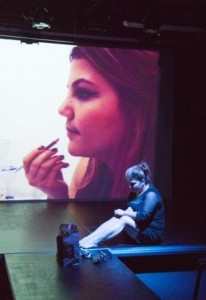
Massey University’s School of English & Media Studies will lead the way in Aotearoa/New Zealand arts education by launching a new paper in creative activism in 2015. Launching simultaneously at Wellington and Auckland campuses in first semester 2015, 139.333 Creativity in the Community will immerse teams of students in the art and science of creative communication for social change, with guidance from experienced Expressive Arts educators. Students will be able to make a film or documentary, stage a collaborative community theatre event, use creative writing, or combine all of these, to work with a community group on a real issue. Wellington course coordinator Associate Professor Elspeth Tilley said “communication activism pedagogy is an emerging trend internationally. It involves teaching students to apply their creative communication knowledge and skills to work with community partners to promote social justice.” The Creativity in the Community course will equip students to plan, implement and evaluate these kinds of applied arts projects, giving them hands on experience in delivering creative activism but also requiring them to understand the ethical and managerial dimensions. Dr Tilley said there was a strong research and scholarship base behind creative activism that students will connect with in ‘Creativity in the Community’ to understand how to make their arts interventions effective and compelling. “Internationally, students have worked on issues such as gender inequality and violence, ethnic and racial prejudice and discrimination, and health disparities and issues affecting those who live in poverty. Our students will research their communities and team up with local NGOs to choose projects that respond to genuine need. We know that this benefits the students as well as the communities, as service learning has been proven to develop skills in teamwork, project management, risk assessment, communication, professionalism and a host of other competencies that will ensure our students hit the ground running when they enter the workforce. A big plus of creative activism pedagogy is that it also develops students as engaged citizens who feel empowered to use their voice effectively to create a better world.”
Dr Tilley will coordinate Creativity in the Community at Wellington, while at Albany campus it will be led by Dr Rand Hazou, a specialist in applied and documentary theatre who has international research links with social justice theatre projects, as well as strong connections with theatre-for-social change groups in the Auckland region.
Recent Seminars
“Emancipated spectatorship and subjective drift: understanding the work of the spectator in Erik Ehn’s Soulographie” by Dr Emma Willis (Auckland University).
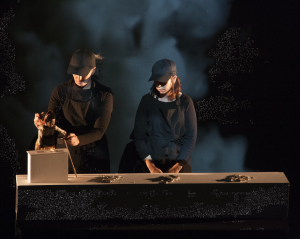
Erik Ehn’s ‘Soulographie’
At LaMaMa Theatre in New York, 2012, Erik Ehn staged Soulographie, a cycle of seventeen of his plays each concerned with genocide. The project was marked by what Ehn calls ‘subjective drift,’ a shared contemplative practice where ‘I’ and ‘you,’ are ‘nicely confused.’ This presentation closely examines the ethical force of an aesthetic-contemplative mode in theatre through a study of subjective drift as interpretive and emancipatory work in the sense meant by Jacques Rancière when he speaks of an ‘emancipated spectator.’ In reflecting upon Soulographie I ask how the ‘emancipated spectator’ might be understood in more fully theatrical terms than those Rancière outlines and, furthermore, how such a figure – and the relationships that constitute him or her – might be read ethically. Such ethical relations are not dependent on a physical reconfiguration of theatrical space but are enacted when the theatrical subject itself – genocide – is emancipated through theatrical language. In its extremity, genocide is a provocative lens through which to ask what might be required of spectators and what is at stake when we speak of emancipation.
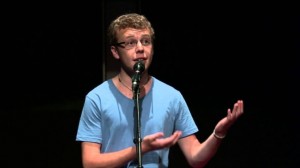 Ben Fagan, performance poet, is funny, thoughtful, moving, and he has honed his art in fierce slam competitions where he’s taken out multiple prizes and awards. He will be performing at Arts on Wednesday on September 10 in Wellington.
Ben Fagan, performance poet, is funny, thoughtful, moving, and he has honed his art in fierce slam competitions where he’s taken out multiple prizes and awards. He will be performing at Arts on Wednesday on September 10 in Wellington.